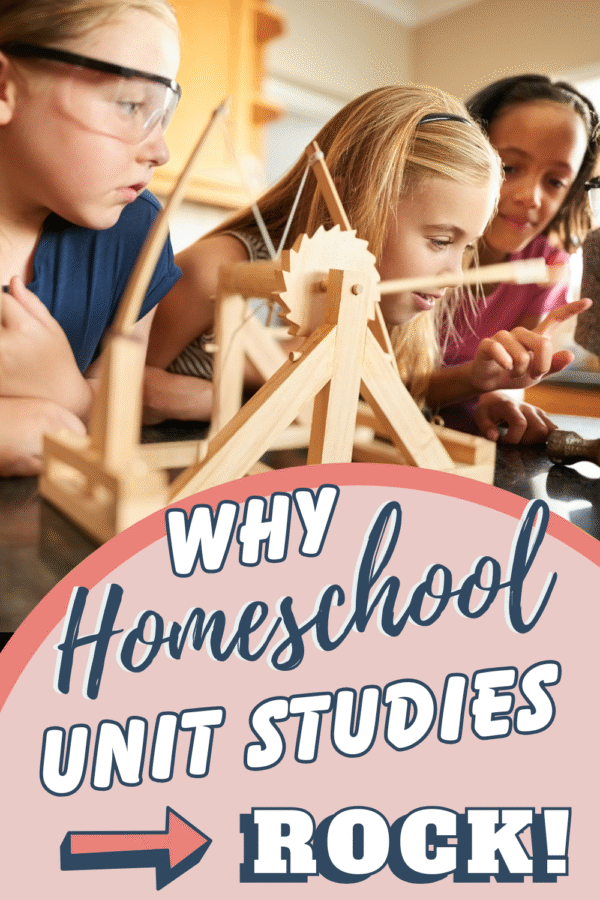Homeschool Unit Studies: Transform Your Homeschool With This One Powerful Method

Homeschool unit studies are such a fun and flexible way to teach your kids at home! Instead of jumping from one subject to another, you can tie everything together around one exciting theme, like space, insects, or a favorite picture book. It makes learning feel more connected and a lot more engaging. Plus, it’s a great fit for teaching multiple ages at the same time. In this post, I’ll show you why homeschool unit studies work so well, how to plan one without stress, and easy ways to make it fun for the whole family.
What Exactly are Homeschool Unit Studies?
Homeschool unit studies are themed learning adventures that blends several subjects (for example, science, reading, art, and even math) into one cohesive experience. Because everything is linked to a single topic, kids naturally see how concepts connect in real life. In education-speak, homeschool unit studies are one flavor of integrated learning or cross-curricular teaching—but we’ll keep things simple and stick with “unit studies”

Why Homeschool Unit Studies Rock (a.k.a. The Big Benefits)
- Hands-On Learning Comes Naturally – Crafts, experiments, cooking, building models… homeschool unit studies practically beg for hands-on activities. This is one of the best methods for learning for your kinesthetic learners!
- Perfect for Multi-Age Families – One volcano unit = lessons for kindergartener and middle-schooler. Just adjust depth and assignments! I’ve always taught my kids together in this way.
- Stronger Connections = Better Comprehension – Kids see how math, language, and science weave together, which cements understanding.
- Every Learning Style Gets Love – Visual, auditory, kinesthetic, social—you can cover them all!
- Built-In Engagement – A cool topic keeps their attention way better than a random worksheet ever could. I can promise you this!
- Works with Any Homeschool Approach – Charlotte Mason, Montessori, relaxed, eclectic—you name it, unit studies slide right in.
- Easy Break from “Same Old” Curriculum – Need a refresh? Swap a week of textbooks for an exciting theme and watch motivation soar. Holidays work great with this method! Do a unit study of Christmas or Easter or Thanksgiving for a week or two. You could also do mini-unit studies for just a few days of smaller holidays like St. Patrick’s Day or Veterans Day.
“But Are Cute Themes Really Effective?”
Short answer: yes! Themed learning isn’t just Pinterest-pretty. When kids dive deep into apples, oceans, or ancient Egypt, they’re:
- Practicing higher-order thinking skills
- Building vocabulary tied to real experiences
- Remembering concepts longer (hello, sticky memories!)
Mix sensory play, read-alouds, and hands-on projects, and you’ve got an unbeatable recipe for retention.
Four Easy Ways to Structure Your Homeschool Unit Studies
- All-In – Every subject ties to the theme (yes, even math snacks!).
- Mostly Themed – Core subjects like math or grammar stay separate.
- Some Themed – Just a few subjects (think science + literature) connect to the topic.
- Single-Subject – One class (often science or social studies) becomes the unit; everything else is business as usual.
There’s no wrong pick—start where you feel comfortable and tweak as you go.

How Long Should a Unit Study Last?
- Quick Dip: 1 week on butterflies
- Deep Dive: 2–3 weeks on weather
- Semester-Size: 6–9 weeks on world geography
Broad topics need more time; narrow ones can wrap up fast. If you stretch beyond two weeks, consider limiting the theme to just a couple subjects to avoid burnout.
Choosing Themes Your Kids Will Love
Inspiration
| Child Interests |
| Seasonal Picks |
| State Standards |
| Picture Books & Novels |
| Current Events |
How it works
| Ask your kids—instant buy-in! |
| Pumpkins in October, flowers in spring. |
| Check required topics, then build a fun spin. |
| My personal fave—stories spark endless ideas. |
| Solar eclipse? Perfect time for a space unit. |
Tip: Keep a running list of theme ideas in your planner or phone so inspiration never slips away.

Do Homeschool Unit Studies Work for Older Kids?
Absolutely! Middle-schoolers can research, debate, and create presentations. High-schoolers might tackle primary-source documents or design experiments. You may not theme every subject (credits still matter), but sprinkling in unit studies keeps learning lively.
Plan Backwards: Start with the Grand Finale
Think celebration first, then draft lessons that lead there:
- Planetarium trip after a space unit
- Medieval feast cooked by kids
- Poetry night showcasing original haikus
A climactic finish adds motivation and cements memories.
Stress-Free Planning Tips
- Borrow Before Building – Grab pre-made unit studies for your first try (check my Time for Reading TPT store).
- Mix & Match Resources – Library books, YouTube videos, and free printables keep costs down.
- Skip What You Hate – Not into messy slime? Choose a clean alternative experiment.
- Use Simple Supplies – Kitchen staples and paper often do the trick.
- Anchor with a Schedule – A loose outline (day 1 books, day 2 experiment…) keeps the week humming.
Where to Find Ideas (and Save Yourself Hours)
- Pinterest Boards – Search “homeschool unit studies + topic.” Follow me on Pinterest!
- Instagram Hashtags – Try #unitstudyideas or #homeschoolunitstudy.
- Blogs (Like This One!) – Browse my archives for theme inspiration.
- Your Local Library – Librarians love helping you find themed materials.
Ready to Try Homeschool Unit Studies?
You don’t have to overhaul your entire curriculum—dip your toes in with a one-week mini unit. If everyone’s smiling (and learning!), stretch your next theme a bit longer. And remember, there’s no “right” way—only the way that fits your family best.
Do you have preschoolers? Homeschool unit studies work amazing for preschoolers! Take a look at this blog post about the reasons you should do preschool at home.
Pro tip: Grab my free Homeschool Academic Skills Checklist to make sure you cover the essentials while you plan. It pairs perfectly with any unit study!
Thanks for stopping by! If you’re excited to dive deeper into homeschool unit studies, join my email list below—fresh themes, book lists, and planning tips land in your inbox every week. Happy teaching!
Homeschooling academic skills checklist
FREE Homeschooling Academic Skills Checklist
I created this Homeschooling Academic Checklist to help homeschooling families have an overview of what to teach in core subjects like Phonics/Reading, Writing, Math, History, Science, and Bible. This 30-page guide will help the new homeschooler and homeschooling veterans alike with keeping track of what our child has learned. Grab it today for FREE!







